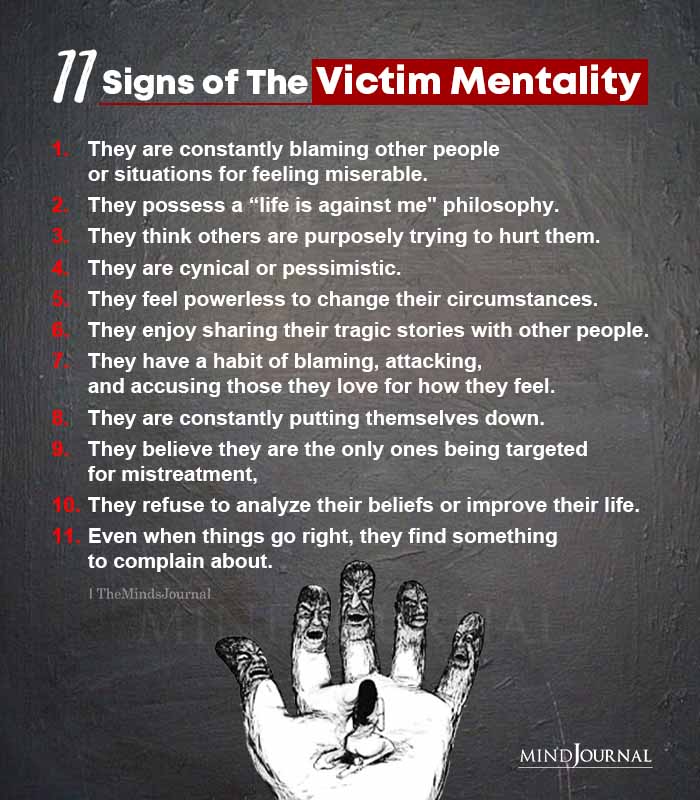We’ve often heard of the term “victim mentality” or “victim complex”. Psychologists define this term as someone who has a dysfunctional mindset characterized by an incessant need to feel persecuted in order to gain attention or avoid responsibility for oneself.
It may be annoying to be around someone who is always complaining about how their life isn’t quite going their way and how everything is falling apart. They tend to act as though they can’t do anything about it. They even go out of their way to sabotage things for themselves because they feel like they don’t deserve good things in life.
We all know someone who would rather cry and complain than do something about their situation. People with victim complexes have a tendency to victimize themselves in order to gain sympathy. They wallow in self-doubt and negative self-talk rather than taking matters into their hands and fixing them.
The foundation of victim mentality is built around three core beliefs. They are:
- You are destined to experience bad things
- These bad things that are happening are occurring because of a situation or a person
- There is really no point in trying to change these negative events since they are destined to happen and any efforts to prevent, change, or avoid are of no value.
This condition is a learned behavior that people can unlearn with some effort and self-determination. There are some character traits that are seen in people with a victim complex.
Related: How To Build Your Belief In Yourself
10 Signs Of Victim Mentality
1. Giving Up Easily
People with a victim mentality will find any reason to justify why it’s not going to work out and make excuses before even starting the project. Basically, they give up even before they start; they tend to give up easily without taking action.
Giving up is easier than trying to think of solutions to the problem at hand. There’s no fun in putting effort into something you are confident won’t work out, even if there’s a pretty good chance that it might. Quitting comes easily to them, rather than working hard to make something a reality.
2. Constantly Plagued By Self-Doubt
This is a fairly major sign of someone suffering from a victim complex. They don’t believe in themselves and so they don’t follow through with the amazing ideas that come to their mind.
They tend to put it off, make excuses, and find an escape or a way around it, rather than work hard to give it fruition. Self-doubt also becomes inevitable when they keep on thinking things like “I’m not smart enough for that job”, “they won’t like me the way I am” or “I am not that talented to succeed.” Their self-doubt controls them, and they let it.
3. Letting Others Control Their Life
They let others control their lives because they feel that others know more about them, and what is good for them. Taking life decisions based on someone else’s opinion is an extremely unhealthy way to live. This way they do not take responsibility when things go wrong and always blame others for their mess.
If you let somebody else decide what you should and shouldn’t do with your life, then you are making a big mistake. Letting others control your life and make your decisions is a sure-shot way of being unhappy.
Related: 8 Steps To Improving Your Self-Esteem
4. Negative Self-Talk And Self-Sabotaging Themselves
People who suffer from victim complex have an extremely harsh internal critic, which leads to them sabotaging themselves, over and over again. This makes them continue to be in a state of “not being good enough”. They continue to engage in negative self-talk such as “everything bad happens to me”, “I can’t really do anything about it, so why bother?”, or “no one cares about me”.
Negative self-talk can damage a person’s ability to be resilient that making it harder for them to bounce back from the challenges of life, and heal. Once you become addicted to sabotaging yourself, it always seems like the more convenient and easier option, and that is exactly what victim mentality feeds on to survive.
5. Trying To Please Everyone At The Cost Of Their Own Happiness
They run around trying to please everyone at the cost of their own happiness, and wellbeing. They want to be in the middle of a crisis so that they can be rescued. This then becomes everyone else’s fault because they were busy paying attention to others’ needs instead of their own needs.
Ultimately when things go south, they end up blaming others for their problems and misfortunes, all the while refusing to acknowledge the fact that they are responsible for what is happening to them. This is one of the most important signs of the victim complex.
6. Being Bitter And Resentful For Not Having A ‘Happy Life’
Due to their constant fear of being alone, they end up compromising their happiness and self-respect, just so they can have certain people in their life. Their primary focus is on being a people-pleaser and being what others want them to be, instead of who they really are on the inside.
As expected, when everything falls apart and these people abandon them, they end up feeling bitter and resentful and not in control of their lives. The ultimate sign of victim complex is relying on others to make them happy instead of being happy by themselves. Because they never focus on their own fulfillment, they end up getting hurt and disappointed over and over again.
Related: 10 Signs Of Self-Hatred And How To Overcome
7. Always Making Excuses For Quitting
They quit very easily, and on top of that make numerous excuses for doing so. This way they end up sabotaging their own happiness and remain in that zone of victim mentality. They tend to fear rejection, failure, or always choose to stay in their comfort zone for fear of getting judged. They make excuses to avoid their constant feeling of not being good enough.
This ultimately ensures that they never reach their goals in life, and when this happens, they feel even more unhappy. And just like this, the vicious cycle continues.
8. Engaging In Self-Destructive Behavior, In Order To Cope With Negative Feelings
They tend to seek instant relief when they are not feeling good about themselves. So they attempt to feel better by engaging in self-destructive behaviors such as addictions, toxic relationships and deliberately making bad decisions.
They end up destroying themselves mentally and emotionally, just so they can run away from the unwanted feelings that keep on swirling in their minds.
9. Constantly Beating Themselves Up
When they set out to achieve a goal and fail to reach the desired outcome, they think they are just not good enough; failure is something that terrifies them, and so whenever they’re faced with even a little part of it, they fall down and refuse to get back up.
They attack themselves with self-blame and punish themselves when things go wrong. They beat themselves up when things don’t quite go their way and when this happens, they are quick to pin the blame on others, but deep down inside, they actually blame themselves.
Related: 11 Signs Of Self-Pity And How To Overcome
10. It’s Always Someone Else’s Fault
It’s always someone else’s fault for a person as far as a person with victim complex is concerned. This happens because they lack self-responsibility and accountability and blame others when things go wrong. Since they always give their responsibilities to someone else, it ultimately becomes the other person’s fault when things don’t go as planned.
Even if you show them evidence that only they’re responsible for something, they will vehemently disagree and fight with you relentlessly to convince you otherwise. They are mentally not strong enough to grasp the concepts of accountability and responsibility.

How Can Someone Get Rid Of Their Victim Mentality?
If this sounds like something you relate to, you are probably wondering how to fix this. Are there any strategies that can help you to deal with your victim complex? If you want to stop feeling like a victim, you have to take responsibility for your own actions. Placing blame on others or situations for things not going your way, and running away from your feelings of not being good enough will always get you stuck in this vicious cycle.
If you want to heal, it’s time to start listening to your inner self and examine your habits and thought patterns. Living with a victim complex can ruin your life if you let these feelings take over and impact your life.
You can learn to change your thought patterns. Here’s what you can do:
- Seek out a therapist or counselor
- Practicing mindfulness and meditation
- Seeking advice from trusted friends and family
- Practice gratitude
- Self-reflection and asking why this thought is creating suffering
- Take note of negative self-talk
- Offer encouragement and validation to yourself by pointing out the good things you do, highlighting your achievements
- Work on self compassion
- Create a plan to achieve your goals
- Reading self-help books
Related: How to Rise Above Victim Mentality and Get Back your Power
To conclude, having a victim complex can be challenging since it interferes with your capabilities of growing as an individual. It is important to understand that only you can change the way you think about yourself. Self-determination is an essential part of healing from victim complexity.
And the moment you start believing in yourself and have confidence in your abilities, you will not just be happier, you’ll also slowly move away from seeing yourself as a victim all the time.











Leave a Reply
You must be logged in to post a comment.